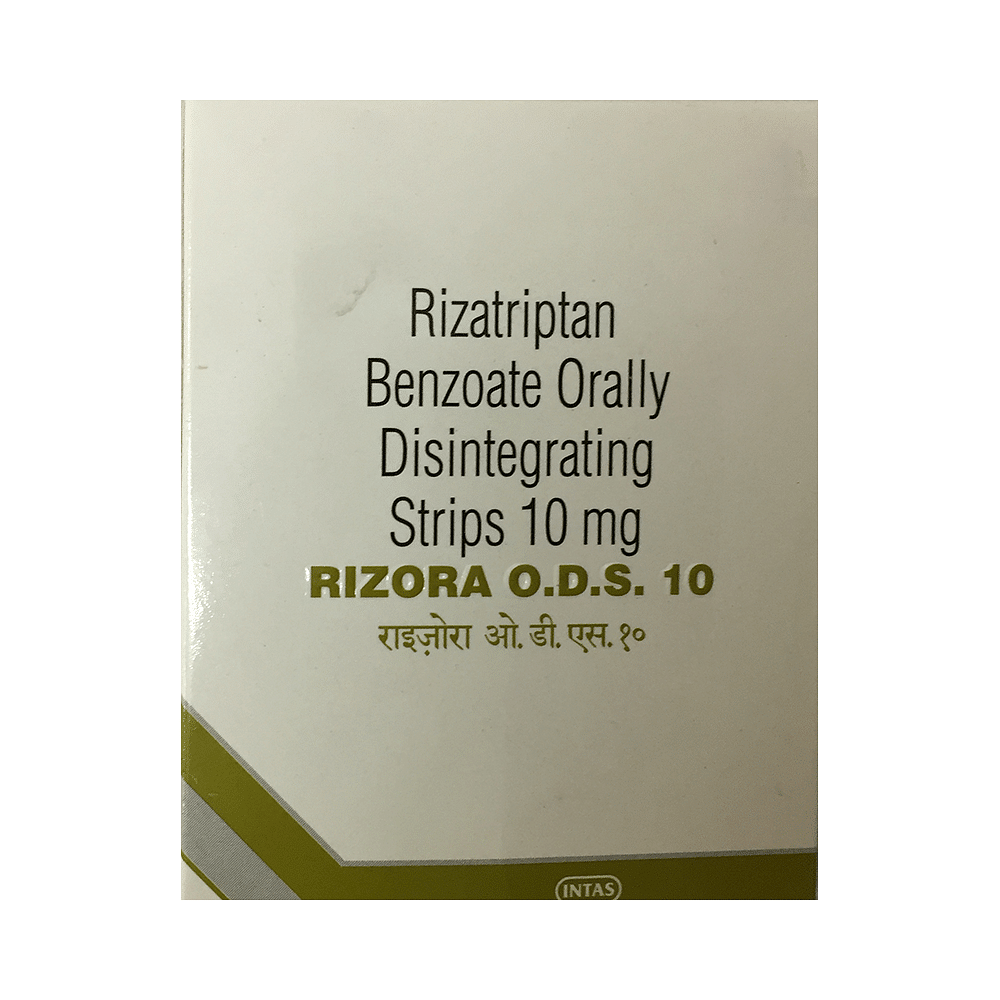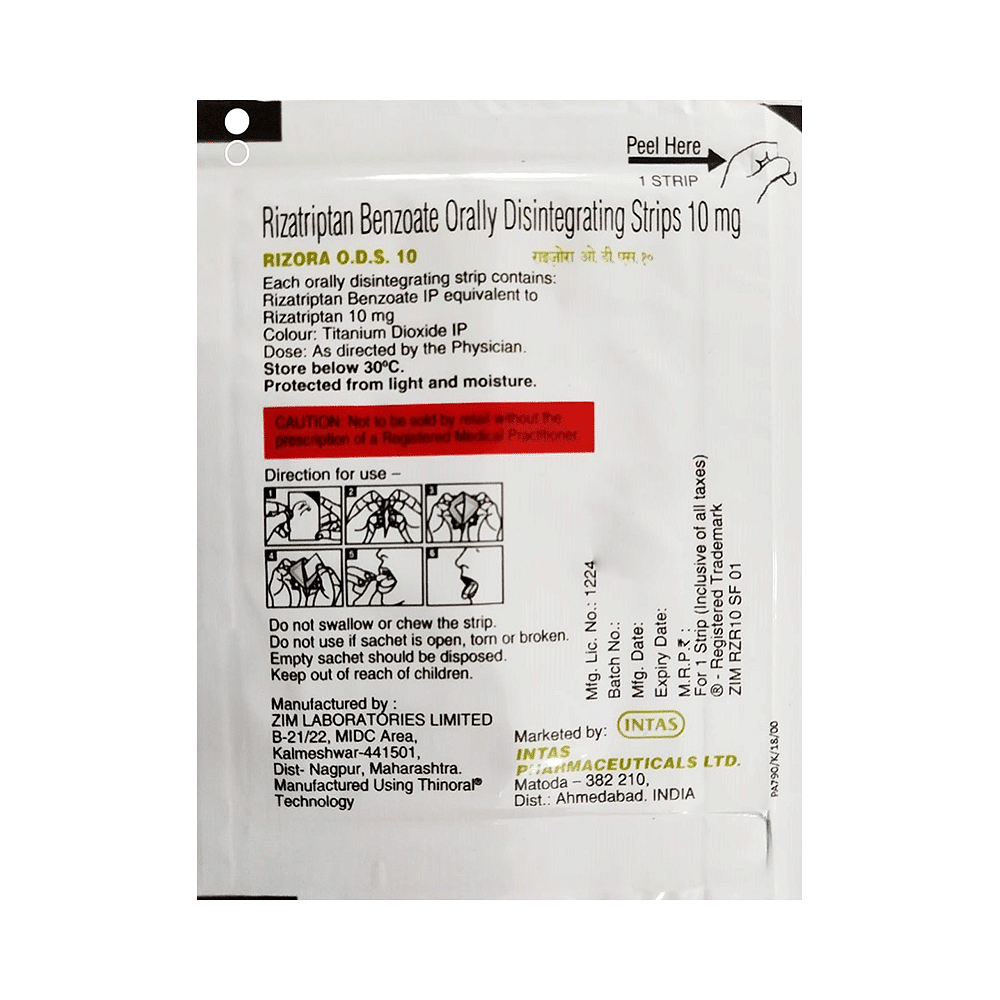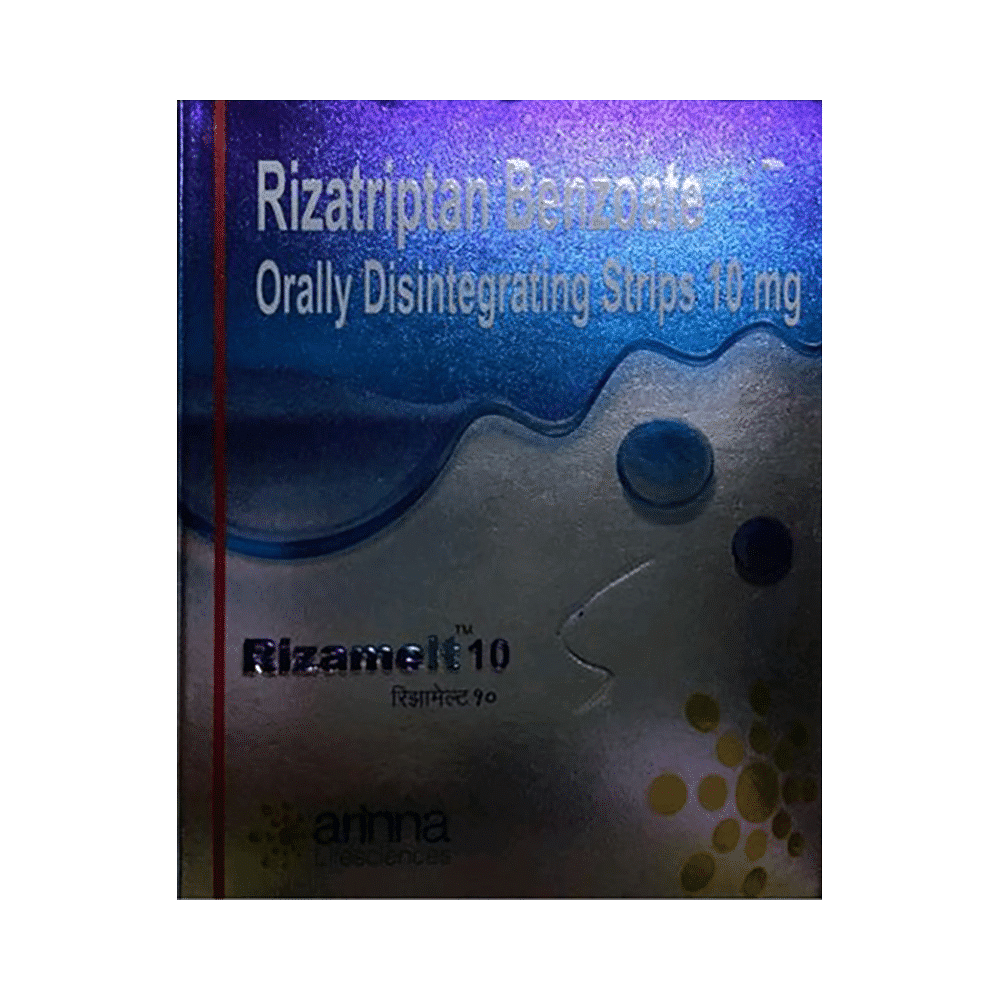

Rizora ODS 10 Disintegrating Strip
Manufacturer
Intas Pharmaceuticals Ltd
Salt Composition
Rizatriptan (10mg)
Key Information
Short Description
Rizora ODS 10 Disintegrating Strip is used to treat acute attacks of migraine, relieving symptoms and preventing the attack from becoming worse.
Dosage Form
Disintegrating Strip
Introduction
Rizora ODS 10 Disintegrating Strip is used to treat acute attacks of migraine. It works by narrowing the blood vessels, thereby relieving migraine headaches. This medicine helps by constricting (narrowing) the blood vessels, thereby relieving the migraine headaches.
Directions for Use
Take this medicine in the dose and duration as advised by your doctor. Do not handle the strips/film with wet hands. Keep it in your mouth but do not swallow it. Rizora ODS 10 Disintegrating Strip may be taken with or without food, but it is better to take it at a fixed time.
How it works
Migraine headaches are thought to result from the dilatation of blood vessels in the head. Rizora ODS 10 Disintegrating Strip works by constricting (narrowing) these blood vessels, thereby relieving the migraine headaches.
Quick Tips
Have your meals at the same time everyday Avoid bright lights and extreme temperatures Avoid loud music and noisy places Avoid chocolates, cheese, processed food, alcohol, and smoking Get enough sleep and avoid stress
Related Medicines
Frequently asked questions
Before taking Rizora ODS 10 Disintegrating Strip, it's essential to inform your doctor about any pre-existing medical conditions, such as heart disease, high blood pressure, diabetes, liver or kidney disease, or a family history of heart disease. Additionally, let them know if you smoke, have experienced menopause, are a man aged 40 years or older, or have had short-lived chest pain and tightness. You should also disclose any medications you're taking, including antidepressants like sertraline, escitalopram oxalate, fluoxetine, venlafaxine, or duloxetine.
Before taking Rizora ODS 10 Disintegrating Strip, it's essential to inform your doctor about any pre-existing medical conditions, such as heart disease, high blood pressure, diabetes, liver or kidney disease, or a family history of heart disease. Additionally, let them know if you smoke, have experienced menopause, are a man aged 40 years or older, or have had short-lived chest pain and tightness. You should also disclose any medications you're taking, including antidepressants like sertraline, escitalopram oxalate, fluoxetine, venlafaxine, or duloxetine.
What are the symptoms of Rizora ODS 10 Disintegrating Strip overdose?
Overdosing on Rizora ODS 10 Disintegrating Strip may cause dizziness, fainting, slow heartbeat, changes in heart electrical activity, vomiting, and difficulty retaining urine or stools.
What are the symptoms of headache caused due to medication overuse?
Medication overuse headache is characterized by frequent or daily headaches despite (or because of) regular use of headache medications. Consult your doctor if you experience such symptoms, who may recommend discontinuing the medication for a while.
Can Rizora ODS 10 Disintegrating Strip be used for the prevention of migraine attacks?
No, Rizora ODS 10 Disintegrating Strip is not intended for preventing migraine attacks. It's only meant to be used when there's a clear diagnosis of migraine has been established.
What triggers migraine attacks?
Migraines may be triggered by various factors such as caffeine withdrawal, hormonal changes during menstruation or birth control use, sleep pattern disruptions (insomnia, oversleeping), alcohol consumption, skipping meals, smoking, strenuous exercise, loud noises, bright lights, strong smells, exposure to smoke and stress.
Does migraine run in families?
Yes, migraines can run in families. Women are more likely to experience migraines than men, and some women may have fewer migraines during pregnancy.
Can Rizora ODS 10 Disintegrating Strip increase my blood pressure?
Yes, taking Rizora ODS 10 Disintegrating Strip may cause an increase in blood pressure. Monitor your blood pressure during therapy with this medication.
How do I know a migraine attack is about to start?
Some people experience aura before a migraine attack, which can include visual disturbances (flashing lights, zig-zag patterns), numbness or tingling sensations, dizziness, difficulty speaking, or loss of consciousness. If you have these symptoms, it may indicate an impending migraine attack.
Can I take Rizora ODS 10 Disintegrating Strip with propranolol?
Yes, you can take both propranolol and Rizora ODS 10 Disintegrating Strip together. However, since propranolol may increase the levels of Rizora ODS 10 Disintegrating Strip, take a reduced dose (5mg) of Rizora ODS 10 Disintegrating Strip instead of the usual 10mg.
When should I start taking medicines used to prevent migraine?
You should consider starting prevention medications if you've tried avoiding triggers but still experience migraines. These medicines are also recommended for severe or frequent migraine attacks, or when your attacks occur frequently.
Can Rizora ODS 10 Disintegrating Strip cause liver damage?
No, Rizora ODS 10 Disintegrating Strip does not cause liver damage. However, inform your doctor about any pre-existing liver problems before taking this medication.
How soon should I take Rizora ODS 10 Disintegrating Strip when the attack starts?
Take Rizora ODS 10 Disintegrating Strip as soon as possible once your migraine headache has started. Always follow the exact instructions provided by your doctor regarding dosage and timing.




